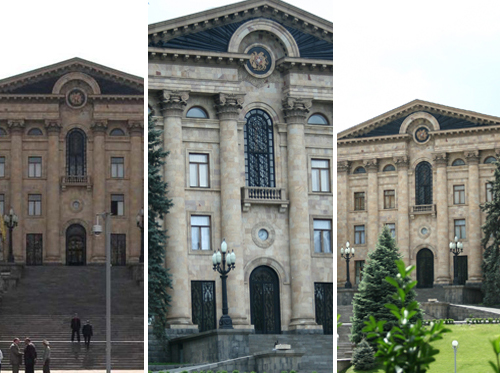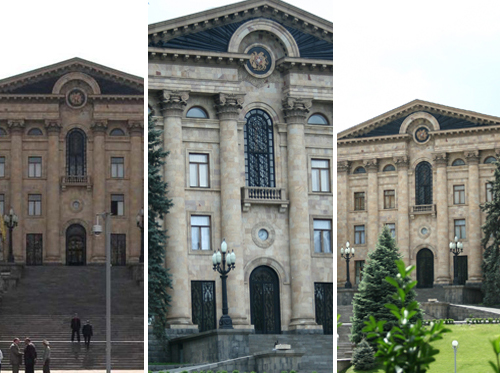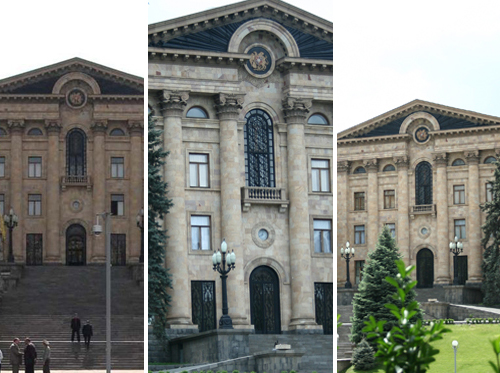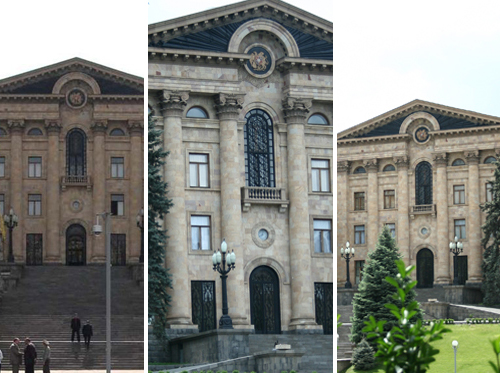Ahead of May 6 elections to the Armenian National Assembly of 5th convocation, Mediamax launches a special project: “National Assembly Elections: v1.0-v4.0”, which aims to present the most interesting facts and events of 1995, 1999, 2003 and 2007 elections.
We suppose this retrospective will be useful for our readers and for the participants of upcoming elections.
Elections to Armenian National Assembly of 1st convocation were held on 5 July 1995. 190 deputies should have been elected (150- under a majority and 40 - under a proportional vote system). A referendum on the adoption of a new Constitution of the Republic of Armenia, which significantly strengthened the presidential power, was held the same day.
About 1000 candidates and 13 parties took part in elections: 6 parties making the “Republic” unification, which was headed by the leading Pan-Armenian National Movement (PANM). The bloc also included Ramkavar-Azatakan (Liberal Democratic) Party of Armenia, Social-Democratic Party Hnchakyan, Christian-Democratic Union of Armenia, Intellectual Armenia and Republican Party of Armenia.
5 parties crossed the 5% threshold set by the law: “Republic” unification – 50% (20 deputies), “Shamiram” – 20% (8 deputies), the Communist Party of Armenia – 15% (6 deputies), the National-Democratic Union 7,5% - (3 deputies), the National Self-Determination Union -7,5% (3 deputies).
“Republic” became the biggest faction - 117 deputies. A deputy group “Reforms” was also set up in the parliament (31 deputies), and 21 deputies were not members of any faction or deputy group.
“Yerkrapah” deputy group was established later (17 deputies).
Babken Ararktsyan was elected the Chairman of the Armenian National Assembly of the first convocation.
Scandals
Ter-Petrosyan vs. Dashnaktsutyun
Upon the decree of Armenian President Levon Ter-Petrosyan, the activity of Dashnaktsutyun party was banned 6 months before elections. The party was accused of the murder of former Yerevan Mayor, one of PANM leaders Hambardzum Galstyan, as well as of having a terrorist organization “Dro” inside it. Dashnaktsutyun leaders Vahan Hovhannisyan and Armen Rustamyan were sent to prison. Accusations against them were not confirmed afterwards. In his May18,1995 address to the parliament, Levon Ter-Petrosyan accused Dashnaktsutyun of terrorism and political murder, stating that Dashnaktsutyun “is not a political party but a terrorist and fascist organization.” Dashnaktsutyun turned down the accusations, stating that Ter-Petrosyan had simply eliminated a popular rival ahead of the election.
A number of international organizations and states reacted to the ban of Dashnaktsutyun’s activity. In particular, the U.S. Embassy in Yerevan issued a statement expressing concern over the future of democratic reforms in Armenia and noting that the suspension of the activity of country’s largest opposition party “runs counter to established principles of democracy and freedom of speech.” USA urged upon the authorities and Dashnaktsutyun to engage in a dialogue.

Photo: Photolure
“Our step, if looked at from the outside, seems very antidemocratic: to ban a party, to close party newspapers - and at that, done by a person who has a democratic image - it is inexplicable. But whether they want to believe it or not, by this very step I am saving democracy in Armenia from terrorism, which I regard as the greatest danger for all young democracies. Dashnaktsutyun is not a party. It’s a terrorist organization,” Levon Ter-Petrosyan said in an interview to The Christian Science Monitor in May 1995.
Levon Zurabyan vs. Nikol Pashinyan
Defended the honor of his wife
Moskovskiye Novosti [Moscow News]
05.07.1995
Women’s public-political organization “Shamiram” was established on the eve of parliamentary elections in Armenia. Armenian women do not traditionally get engaged in politics and it was decided to put an end to this practice. However, members of “Shamiram” were not ordinary women, they were chosen. Among the leaders of the organization were: Anahit Torosyan - the wife of Armenian Foreign Minister Vahan Papazyan, singer Nadezhda Sargsyan, Shogher Matevosyan - the wife of Armenian President’s spokesman Levon Zurabyan. Minister of Internal Affairs Vano Siradeghyan headed the extremely active election campaign of “Shamiram”. Even a summer café “Shamiram” opened in Yerevan.
However, an accident occurred during the preparation of “Shamiram” to elections. Nikol Pashinyan, a reporter of “Lragir” daily published an ironical interview with Shogher Matevosyan. In an introduction to that interview, he wrote: “At the appointed time we found a room to stay alone with Shogher Matevosyan. For an interview”.

An uninvited guest visited the editorial office of “Lragir” the next day. It was Armenian President’s spokesman Levon Zurabyan. In the office of the Chief Editor the jealous man repeatedly struck Nikol Pashinyan in the face. Well, such things also happen during the election campaign.
Sensation
The election of “Shamiram” to the parliament became the biggest sensation of 1995 elections. “Shamiram” was the first women’s party in Armenia’s history. It was formed by then-Interior Minister Vano Siradeghyan.
The party was set up several months before the elections. In 1995, “Shamiram” again took part in parliamentary elections but failed to gain the necessary vote.
Former member of “Shamiram faction”, singer Nadezhda Sargsyan: “We were working day and night”
I was not too enthusiastic about becoming a party member when they suggested it to me, as I understood that it was a big responsibility which will take much effort and energy and I’ll have little time left for my creative work.
Of course, we all knew about problems but didn’t even imagine that there were so many of them. At first, I should have dealt only with culture, but later on I was forced to deal with issues related to health, education and conditions of military service. We often visited various military units and performed concerts to bring some joy to soldiers and hear their concerns.
Of course, it was a surprise for us to gain the second place at parliamentary elections. But, on the other hand, it was the natural result of our activity - we were working day and night. Many people called us “feminists”, but we always backed strong men trying to raise their spirits. We really did a lot of work - I have never spoken about it before and I am not going to do it now either.

The papers wrote various things about. They called me “immoral”. One of the papers “presented” me with “Nairi” cinema twice. The first time it wrote that Vano Siradeghyan presented me with “Nairi” cinema on March 8, and several months later one media outlet wrote that Vano Siradeghyan gave the cinema to me as a birthday present.
Many people backed “Shamiram”, including Vazgen Sargsyan. But Vano Siradeghyan helped us more than anybody else. He helped us solve a lot of problems.
Armenian media on elections
In 14 July 1995 issue, “Epoch” weekly commented on the election outcome this way:
“Only on July 10, the strange stupor of opposition leaders gave way to violent indignation over the election results issued by the Central Electoral Committee. They accused the authorities of unprecedented falsifications and using of brute force…]
[…As it became known, the opposition seriously discusses the necessity to boycott the new parliament, as the preliminary election results show that the opposition parties will have only 20 seats in the National Assembly. If an agreement is reached, they are all supposed to give up their deputy mandates as a sign against falsifications. However, the possibility of such demarche seems to be unlikely because of the position of the leader of national democrats, former Prime Minister and Defense Minister Vazgen Manukyan. At the same time, the futility of working in such a parliament, which is fully controlled by the authorities, is obvious. It can be said already today that the results of elections and the referendum on draft Constitution would hardly contribute to social cohesion in the country and will in no way become a pledge of normal development of political institutions in Armenia.”
Foreign press about elections
“Kommersant” newspaper wrote in ““Republic” among “Semiramis”” article on July 8, 1995:
“Preliminary results of the elections in Armenia denied the forecasts made a day before: ““Republic” bloc headed by the ruling Pan-Armenian Nationwide Movement (PANM) party which was forecasted to get less than 30% votes considerably exceeded the rate. And “the silver medal winner” of the elections, “Shamiram” (“Semiramis”) women party amazed not only the Central Electoral Committee but also foreign observers. Communist Party of Armenia was the third. The opposition which has ingloriously failed the election campaign closes the list”.
A number of Western papers critically assessed the elections. In particular, The Wall Street Journal Europe gave the following headline to the article devoted to the Armenian elections – “Democracy Gets Left Out in the Cold in Armenia”, Los Angeles Times – “Armenia's Rulers Winning Disputed Vote and the British Daily Telegraph”– “Elections Pave the Way for Armenian Dictatorship”.
Editor of online version of “Aravot” newspaper Anna Israelian: “1995 Elections Seemed to be a Shock”
About Dashnaktsutyun
Flawed parliamentary elections of 1995 were predetermined as the authorities hindered participation of Dashnaktsutyun, one of the most popular political powers.
About the Events at the Theater Square
I quite vividly remember the meeting of representatives of “Erkrapah” volunteer union at the Liberty Square on June 21, 1995. Perhaps, the reason why it was so significant was that it was the first time the power factor in the Armenian politics became so obvious. And it just got stronger and stronger. “Erkrapah” became a political factor which the authorities and opposition tried to use with varied success.
About “Shamiram” phenomenon
“Shamiram” party became a pioneer in some regard. In future, we repeatedly witnessed the syndrome of “project-parties” - unexpectedly emerging on the start of an election campaign with the use of administrative resource.

Of course it was evidently Vano Siradeghyan’s project put into practice with significant use of administrative resource and power levers. However, I would like to note the positive moment concerning “Shamiram” was that their presence in the parliament was often a constraining factor. For instance, on September 26, 1996, when the MPs from the ruling party attacked their colleagues from the opposition it was “Shamiram women” who stood between them. There are many other examples how they tried to defuse men’s growing tension.
About Vice Speaker Ara Sahakyan
3 MPs from National Democratic Union and National Self-Determination Union parties were elected to the parliament. Samvel Gevorgyan’s family had the same number of MPs - three his brothers were MPs. Till now do I remember the scene how Vice Speaker Ara Sahakyan just dropped from the tribune of the National Assembly (I don’t remember regarding which party – NDU or NSDU): “The party having so many MPs as the Gevorgyan family”.
1995 elections became the first link in the chain
On the whole, after 1991 elections neither of the Armenian elections was assessed positively – they were held with the use more and more sophisticated and immoral. Perhaps, my memories about 1995 elections a bit smoothed over against this background. What happened in 1995 seemed to be a shock then. All the following elections were much worse but 1995 elections were the first link in the chain of “bad” elections.
Observers and their assessments
About 185 foreign observers from the OSCE Parliamentary Assembly, Council of Europe, European Parliament, CIS and OSCE and EU joint mission monitored the elections.
According to the OSCE report, the Armenian parliamentary elections showed some reassuring signs in terms of democratic development. “However, there is a whole set of negative points. One political party was eliminated before the elections and the composition of electoral commissions was unbalanced. The law on elections was applied selectively and inconsistently. The provision of the secrecy of voting has not always been strictly adhered to. However, the voting process itself went off smoothly”, the conclusion read.
Observations concerned the CEC activity in the first place: it was noted that “CEC is a political and not an independent body. “To improve the election processes, we recommend the vote-counting process should be more transparent. Following laws on elections should ban presence of police and military servicemen at the election districts”, the OSCE report noted. It is notable that many other observers called the OSCE report “too mild”.
At the same time, according to the International Foundation for Electoral Systems (IFES), domestic and foreign observers registered the following problems: temporary stopping of media activities, intimidation of journalists, discrepancies in the registration of voters, banning of Dashnaktsutyun activities, lack of due and fair examination of court cases, breaches in the voting procedures in military units and hospitals, unusually large number of ballots marked as invalid.
Eventually, a generalized formula of international observers’ assessments occurred: elections were “free but not fair”.
Conclusion
The Armenian National Assembly of the first convocation started working on July 27, 1995, and finished it on June 9, 1999. In early February of 1998, Armenia faced a crisis of power. On February 1998, President Levon Ter-Petrosyan resigned which was followed by the resignation of the leadership of the National Assembly and mass outflow of MPs from “Republic” faction.
Khosrov Harutyunyan was elected the Chairman of the National Assembly.
Aram Araratyan





















